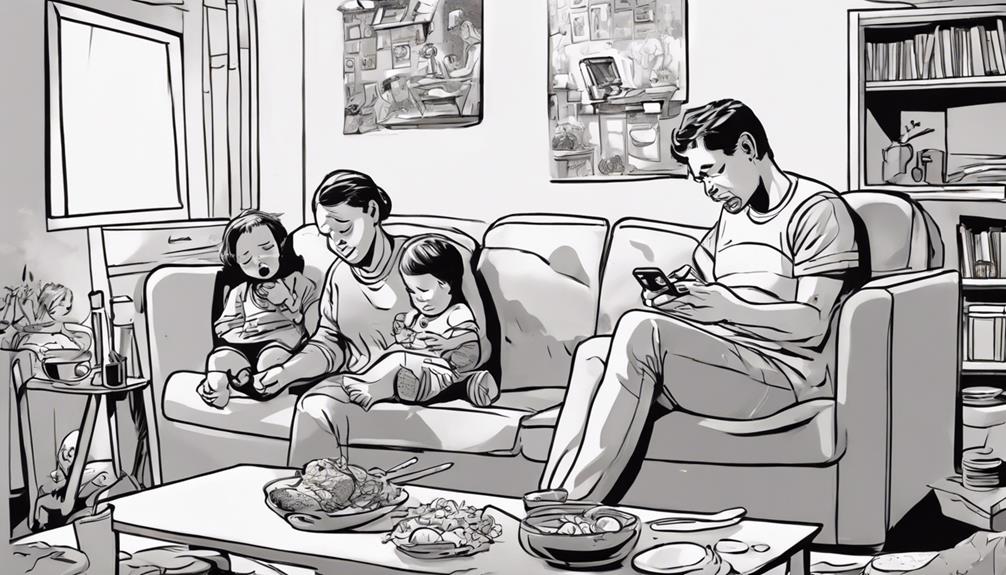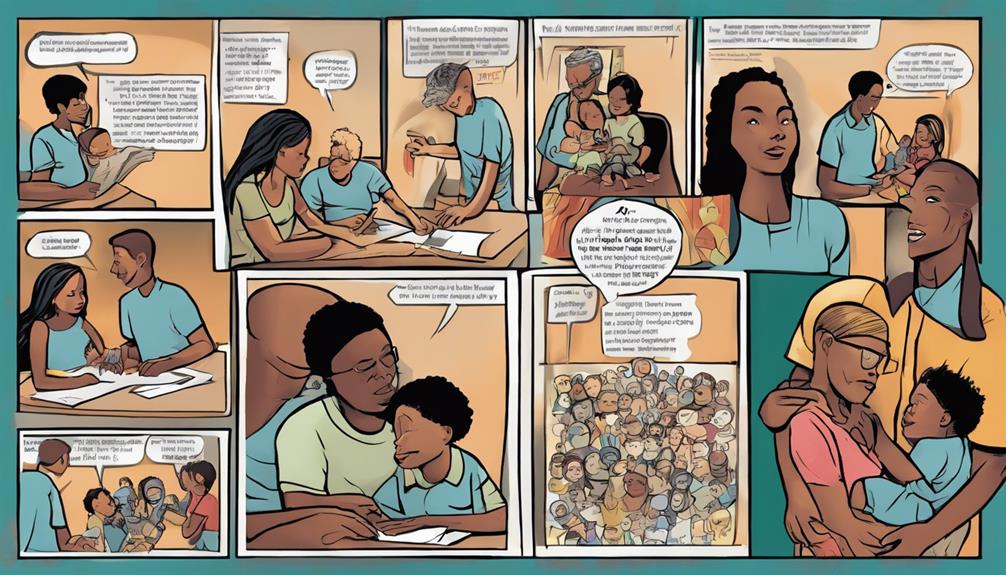When one parent takes on most of the parenting, the family’s life can get really out of whack. It hits mental health hard and messes with how roles are seen. Feeling overwhelmed, bad talk, and unfair chore splits show trouble. **Talk openly** with your partner, set clear lines, and listen well to fix it. Split the chores, like looking after the kids and the house, evenly. **Seek help** from groups, counseling, and friends. Spot the fairness issues, seek tips, and change roles together. Keeping up clear talk, shared goals, and being open can lighten the load and tighten bonds. **Learn more** about fair parenting practices to make things better.
Key Takeaways
- Unequal parenting can lead to one parent bearing the majority of childcare duties.
- Imbalance causes strain on mental health and relationships.
- Open communication is vital to address disparities.
- Establishing fair task distribution is key for a balanced partnership.
- Seeking support and setting boundaries can alleviate the burden on one parent.
The Impact of Unequal Parenting
Essential for both parents to share the emotional load to create a more balanced and harmonious family dynamic. This can lead to better communication, stronger relationships, and a more supportive environment for everyone involved.
Additionally, Unequal parenting, with women often shouldering around 80% of childcare duties, has profound impacts on families and relationships. This unequal distribution of responsibilities creates what's known as the emotional load. Emotional load refers to the mental burden and stress that come with managing and organizing family life, such as remembering doctor's appointments, school events, and birthdays. When one parent, typically the mother, carries the majority of this emotional load, it can lead to feelings of overwhelm, exhaustion, and frustration.
The emotional load can weigh heavily on the parent responsible for it, affecting their mental health and overall well-being. It can also strain the relationship between partners, leading to resentment and conflicts.
Additionally, children can pick up on this imbalance, potentially impacting their understanding of gender roles and responsibilities within a family.
Signs of Parenting Disparity
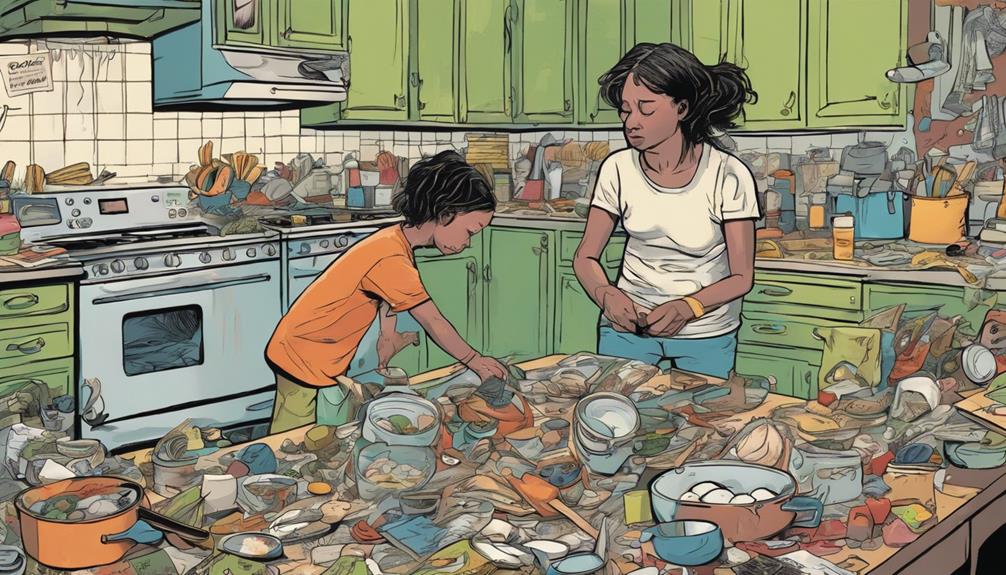
Do you find yourself constantly feeling overwhelmed with parenting duties while your partner seems oblivious to the workload?
Signs of parenting disparity may include communication breakdowns, where one parent feels unheard or unappreciated, leading to resentment and frustration.
These feelings can arise when one parent consistently shoulders the majority of childcare responsibilities without a fair distribution of tasks.
Communication Breakdowns
Communication breakdowns in parenting disparity can manifest through various signs that indicate an uneven distribution of responsibilities within a household. One common indicator is a lack of clear and open communication between partners regarding parenting tasks. For example, if one parent consistently makes decisions about the children without consulting the other, it can lead to feelings of being left out or unappreciated. Additionally, misaligned expectations about who should be doing what can result in frustration and resentment.
Another sign of communication breakdown in parenting is when one parent feels overwhelmed or stressed due to the unequal distribution of childcare duties. This can happen when one partner consistently takes on more responsibilities without discussing or negotiating a fair division of tasks. As a result, the burden falls heavily on one parent, impacting their mental well-being and straining the relationship.
To address these communication breakdowns, it's crucial for both parents to have open discussions about their roles, responsibilities, and expectations. Regular check-ins and sharing feelings can help ensure that parenting duties are distributed fairly and that both partners feel valued and supported.
Resentment and Frustration
Signs of parenting disparity can lead to a buildup of resentment and frustration within a household, affecting both mental well-being and relationship dynamics. When one parent shoulders the majority of childcare responsibilities, it can create feelings of resentment over time. This resentment may stem from the imbalance in duties, with one parent feeling overwhelmed and underappreciated. Research indicating that women often handle around 80% of childcare tasks underscores the prevalence of this issue.
Constantly carrying the mental and emotional load alone is a clear sign of parenting inequality. The weight of decision-making, planning, and organizing can take a toll on an individual, leading to frustration and a sense of unfairness.
Additionally, unequal distribution of physical parenting tasks, such as diaper changing and bathing, can further exacerbate these feelings of strain and resentment.
Moreover, gossiping about your partner's lack of involvement can erode trust and intimacy, highlighting the disparities in parenting responsibilities. It's essential to address these signs of parenting inequality to foster a healthier and more balanced family dynamic.
Communication Strategies for Balance
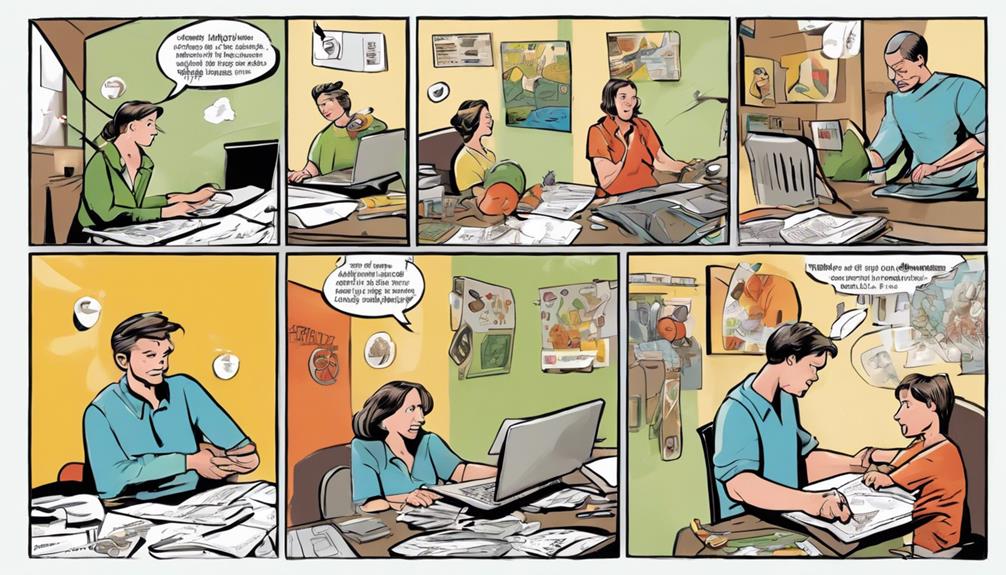
Effective communication plays an essential role in achieving a balanced distribution of parenting responsibilities between partners. When addressing unequal parenting duties, using communication strategies can be key. Open and honest conversations about how tasks are divided are vital. By setting clear expectations and boundaries through communication, you can work towards a fairer distribution of parenting duties.
Regularly checking in and discussing with your partner helps prevent misunderstandings and resentment from building up. Remember to practice active listening and empathy during these conversations to make sure they're productive. Empathy can help you understand each other's perspectives better, leading to more effective communication about sharing parenting responsibilities.
Sharing Household Responsibilities Equally
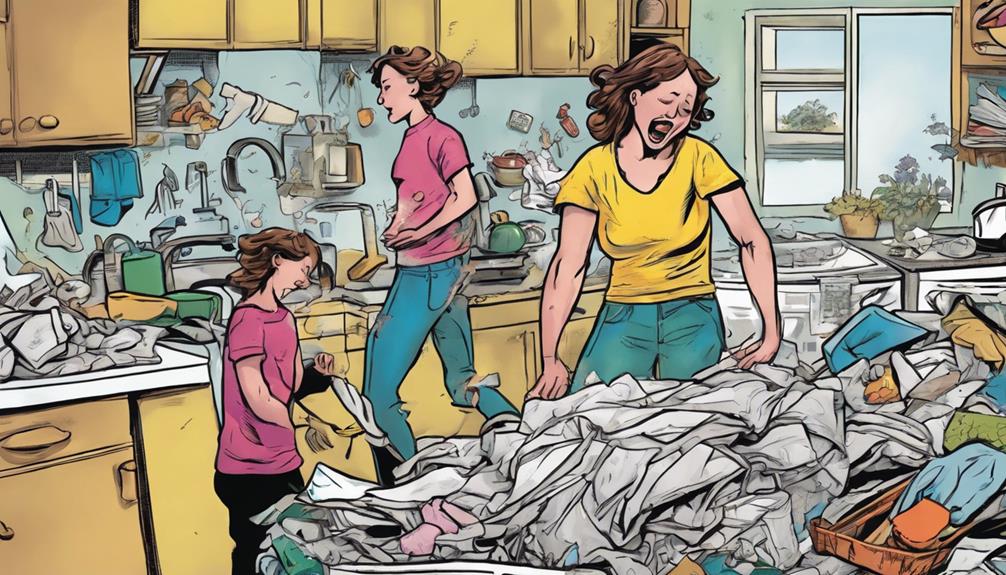
To achieve a more balanced distribution of household responsibilities, it's essential to address the disparities in caregiving duties between partners. The division of responsibilities within a household should be a shared effort, with both parents taking on their fair share of tasks. Research indicates that women often bear a heavier burden when it comes to childcare and house care, spending notably more time on these duties compared to men. By recognizing and actively working to redistribute these responsibilities, couples can create a more equitable and supportive environment for all family members.
To promote a more equal division of responsibilities, start by openly discussing and acknowledging the current imbalance with your partner. Together, create a list of household tasks and agree on a fair distribution that considers each person's strengths and availability. Setting up a shared calendar or task list can help keep track of responsibilities and ensure accountability.
Overcoming Isolation and Burnout

Feeling overwhelmed and isolated as the primary caregiver can take a toll on your mental well-being. It's essential to remember that you're not alone in this struggle and that reaching out for support is a sign of strength, not weakness.
Sharing the Load
By dividing parenting responsibilities and working collaboratively, you can overcome feelings of isolation and burnout that often come with shouldering the majority of the load alone. Sharing the household tasks not only lightens the burden but also fosters a sense of unity within the family. Research indicates that when parents share responsibilities, it positively impacts mental health and overall well-being for everyone involved. It prevents one parent from feeling overwhelmed and promotes a more balanced family dynamic.
To share the load effectively, start by having open and honest communication with your partner about dividing tasks fairly. Create a schedule or system that works for both of you, taking into account each other's strengths and preferences. Setting boundaries is essential to prevent burnout and ensure that responsibilities are distributed equitably.
Seeking Support
Seeking support from various sources can be instrumental in overcoming feelings of isolation and burnout when one parent bears the brunt of all the parenting responsibilities. Joining parenting support groups or seeking counseling can provide a safe space to share experiences and receive guidance. Connecting with other parents facing similar challenges can offer emotional support and practical advice. Addressing feelings of overwhelm and burnout through professional help can lead to healthier parenting dynamics. Seeking support from friends, family, or professionals can help create a support system to share the parenting load effectively.
| Support Sources | Benefits |
|---|---|
| Parenting Support Groups | Safe space to share experiences and guidance |
| Counseling Services | Professional help for healthier dynamics |
| Connecting with Other Parents | Emotional support and practical advice |
| Friends and Family Support | Creating a support system for sharing load |
| Professional Help | Overcoming feelings of overwhelm and burnout |
Recognizing Unbalanced Parenting Dynamics

Acknowledging the imbalance in parenting responsibilities is crucial for addressing and resolving unbalanced parenting dynamics within a household. Research indicates that women often bear the brunt of parenting responsibilities, handling approximately 80% of childcare duties. This unequal distribution can lead to increased stress for mothers and strain on the relationship.
For example, only a third of couples share the responsibility of getting up for a new baby at night, contributing to the disparity in parenting tasks. Additionally, one in three fathers don't consistently engage in essential childcare activities like changing diapers or bathing their babies. These disparities can create resentment and tension within the household.
Recognizing these unbalanced parenting dynamics is the first step towards fostering a more equitable division of responsibilities. By acknowledging and discussing these inequalities openly, families can work together to establish fair and sustainable parenting practices that benefit both parents and children.
Seeking Support and Setting Boundaries

To address unequal parenting responsibilities effectively, consider reaching out for support and clearly establishing boundaries with your partner. Seeking guidance from mentors and experts in parenting can offer valuable advice on how to navigate the challenges of unbalanced parenting dynamics. These individuals can provide insights on communication strategies, negotiation techniques, and ways to create a more equitable division of parenting tasks.
Setting clear boundaries with your partner is also essential in ensuring a fair distribution of parenting responsibilities. By openly discussing and defining each parent's role in childcare, you can establish a framework for shared decision-making and cooperation. Open communication and negotiation are key components in fostering a balanced parenting dynamic that benefits both parents and children.
Recognizing the need for change and taking proactive steps to address unequal parenting responsibilities can lead to a healthier and more harmonious family environment. By creating a supportive space for discussions and decision-making, you can work together with your partner to redefine parenting roles and promote a more equitable distribution of tasks.
Redefining Parenting Roles Together
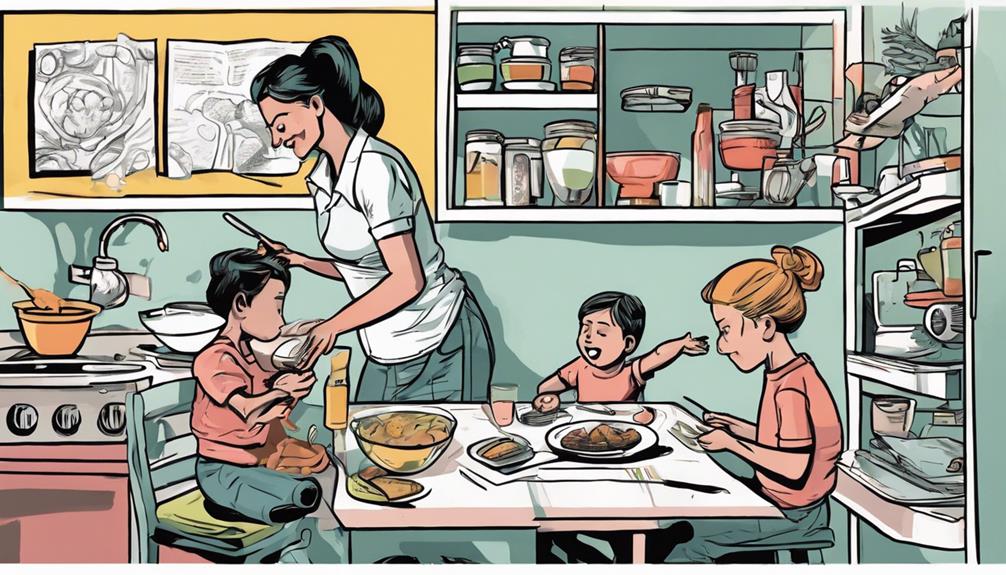
Let's collaborate on redefining parenting roles together to achieve a more balanced and equitable distribution of responsibilities. Research shows that currently, there's a significant disparity in the division of childcare duties, with women often shouldering the majority of the responsibilities.
To address this imbalance, it's important for both parents to actively participate in redefining parenting roles together. By openly discussing and acknowledging the unequal distribution of tasks, couples can work towards a more fair and shared approach to parenting.
Communication plays a key role in this process. By addressing any existing communication failures and increasing consciousness about the division of labor, parents can begin to redefine their roles collaboratively. Creating a shared vision and even drafting a parenting contract can also be beneficial.
Such measures encourage assertiveness and involvement from both parents, fostering a more balanced partnership in raising children. Through mutual understanding and active participation, redefining parenting roles together can lead to a more harmonious and equitable family dynamic.
Preventing Relationship Strain

Unequal parenting responsibilities can strain relationships, burdening one parent to a great extent with the majority of child-rearing duties. Research suggests that in many households, women often take on around 80% of the parenting responsibilities, creating an imbalance that can lead to tension between partners.
To prevent relationship strain caused by this unequal distribution, it's important to address the issue head-on. Communication breakdowns and a lack of awareness about the division of parenting tasks can worsen the strain on relationships, leading to feelings of resentment and frustration.
Open communication is key to preventing relationship strain stemming from uneven parenting responsibilities. By discussing and acknowledging the imbalance, both partners can work together to create a more equitable division of parenting duties. Developing a shared vision and understanding each other's needs and limitations can help alleviate the burden on one parent and foster a stronger, more harmonious relationship.
Prioritizing transparency and cooperation in handling parenting responsibilities can lead to a healthier and more fulfilling partnership.
Achieving Equitable Parenting Practices

Ready to level up your parenting game?
Let's talk about achieving equitable parenting practices.
It's all about effective communication for balance, using shared decision-making strategies, and embracing supportive co-parenting approaches.
These key points can help you and your partner create a fair and harmonious parenting dynamic.
Communication for Balance
How can effective communication contribute to achieving equitable parenting practices and a balanced division of responsibilities between parents?
Communication plays an essential role in establishing a fair distribution of parenting duties. By openly discussing and negotiating responsibilities, parents can work together to create a system that values each person's contributions. Research indicates that unequal distribution of parenting tasks, where women often bear a disproportionate burden, can lead to strain in relationships. Hence, it's important for parents to communicate openly about their expectations, concerns, and needs regarding childcare and household responsibilities.
Acknowledging and appreciating each other's efforts is also crucial for achieving a balanced division of parenting tasks. By expressing gratitude and recognizing the hard work put in by both parents, a sense of teamwork and collaboration can be fostered. This can help prevent feelings of resentment and ensure that parenting responsibilities are shared more equitably.
Effective communication not only strengthens relationships but also promotes a harmonious and balanced parenting environment for the well-being of both parents and children.
Shared Decision-Making Strategies
Establishing a shared vision and fostering clear communication are vital for achieving equitable parenting practices and a balanced division of responsibilities between parents. When it comes to shared decision-making, creating a contract for dividing responsibilities can be an impactful strategy. This contract can outline specific tasks and duties for each parent, ensuring a fair distribution of the parenting workload.
Additionally, addressing communication failures promptly and openly is essential for maintaining a harmonious co-parenting relationship. Research indicates that when couples actively engage in shared decision-making, the likelihood of achieving a more balanced division of childcare duties increases considerably.
Encouraging assertiveness and involvement from both parents is another key aspect of shared decision-making. By empowering each parent to voice their opinions, preferences, and concerns, you can work together to find mutually agreeable solutions.
Supportive Co-Parenting Approaches
Encouraging mutual understanding and active participation from both parents is essential in fostering supportive co-parenting approaches that lead to achieving equitable parenting practices. Supportive co-parenting involves working together as a team, communicating openly, and sharing responsibilities to guarantee a balanced approach to parenting.
By engaging in supportive co-parenting, both parents can contribute equally to childcare duties, decision-making, and emotional support for their children. This approach helps alleviate stress on one parent, promotes a harmonious family environment, and strengthens the parent-child bond.
To implement supportive co-parenting, parents can establish clear expectations, set boundaries, and prioritize effective communication. Sharing parenting goals, discussing challenges openly, and seeking outside support when needed can also enhance the co-parenting experience.
Frequently Asked Questions
When One Parent Does All the Parenting?
When one parent does all the parenting, it can lead to an unfair division of responsibilities and strain on the family. This situation often results in one parent feeling overwhelmed and stressed, while the other might miss out on valuable bonding opportunities with their children.
Sharing parenting duties allows both parents to be actively involved in their children's lives, creating a more balanced and harmonious family dynamic.
How to Deal With an Inconsistent Co-Parent?
Dealing with an inconsistent co-parent can be like trying to wrangle a herd of cats on roller skates – chaotic and exhausting! Start by setting clear boundaries and expectations to help them see the light.
Communication is key; talk about how their actions impact the kiddos. If things are still wonky, consider bringing in a mediator or counselor for backup.
Creating a solid co-parenting plan can wrangle in the chaos and bring some order to the parenting rodeo.
When One Parent Contradicts the Other?
When one parent contradicts the other, it's important to address the issue promptly. Start by calmly discussing your differing opinions in private.
Seek to understand each other's perspectives and find common ground. Try to compromise on a solution that respects both viewpoints.
Consistency is key, so agree on a unified approach moving forward.
Should Both Parents Take Equal Responsibility?
Should both parents take equal responsibility? Absolutely! Parenting is like a team sport, where both players need to show up and give their best.
Sharing the load not only lightens the burden but also strengthens family bonds. When both parents pitch in equally, it sets a positive example for the kids and fosters a sense of unity.
How Can Empowering Teenagers Help Alleviate Unequal Parenting Responsibilities?
Empowering teenagers by building teen independence responsibly can help alleviate unequal parenting responsibilities. By teaching teens important life skills and encouraging them to take on more responsibility, parents can lighten their load and prepare teens for adulthood. This can lead to a more balanced and equal distribution of parenting duties.
Conclusion
In summary, sharing parenting responsibilities is essential for a healthy and balanced family dynamic. By working together, communicating openly, and setting boundaries, parents can prevent burnout, isolation, and strain on their relationship.
Remember, teamwork makes the dream work when it comes to raising children. So, make sure to support each other, redefine roles, and aim for equitable parenting practices to create a happy and harmonious home.

